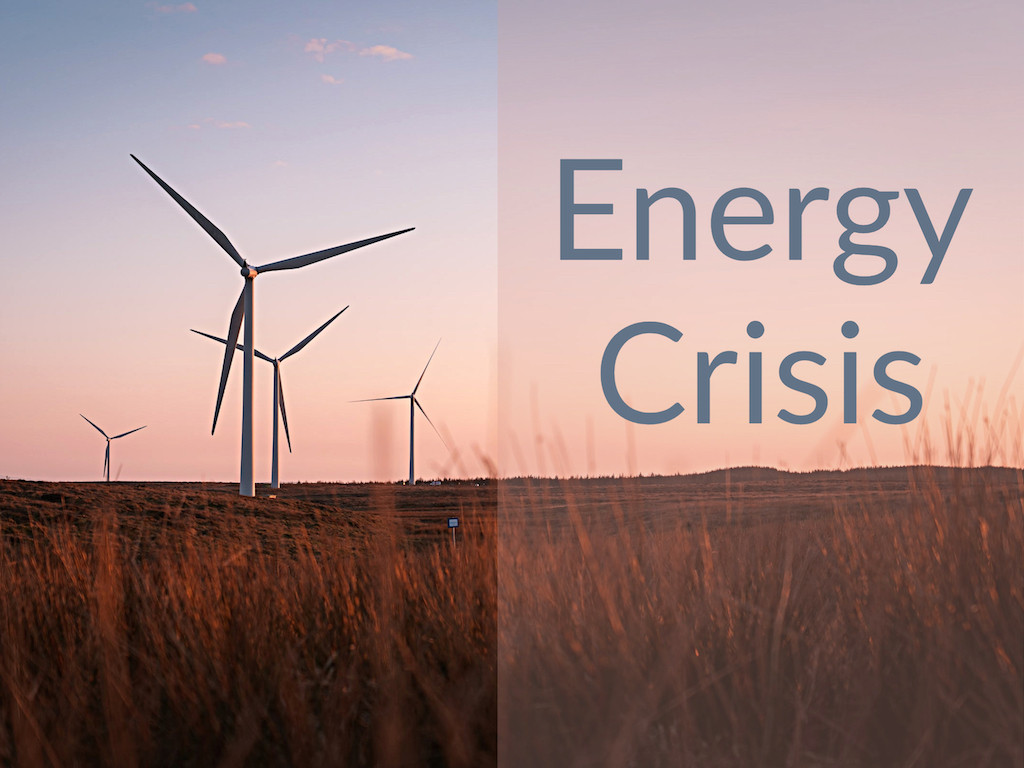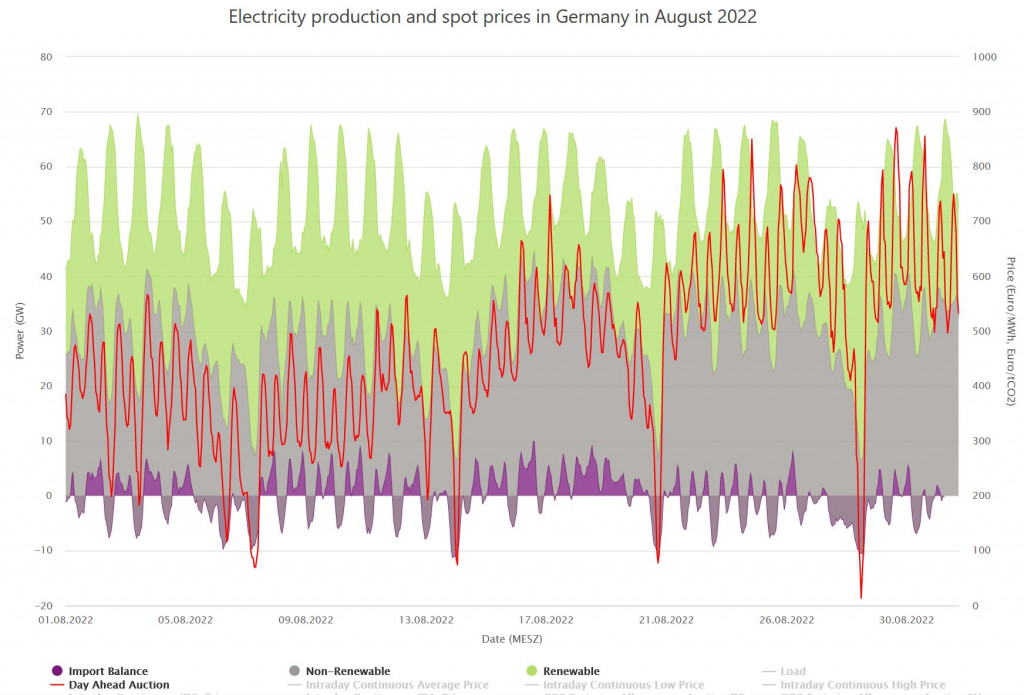Experts Blame Green Energy For Europe's Full-scale Energy Crisis

Experts blame green energy for Europe's full-scale energy crisis: 'A warning to the US'
"Green energy policies in Europe designed to rapidly shift the continent away from fossil fuel dependence have contributed to soaring power prices in the region.
The European benchmark index measuring future electricity prices increased to a record $993 per megawatt-hour (MWh) on Monday, days after prices in France and Germany surged 25%, according to European Energy Exchange data compiled by Bloomberg. By comparison, the average price of electricity in the U.S. hit $129 per MWh in June, federal data showed.
The energy crisis has forced consumers to cut back on power consumption, industrial production declines, and energy rationing across the continent. The European Union Council (EU) scheduled an emergency meeting of EU energy ministers slated for next week in response to the market conditions.
"The skyrocketing electricity prices are now exposing, for different reasons, the limitations of our current electricity market design," European Commission President Ursula von der Leyen remarked during a speech Monday. "It was developed under completely different circumstances and for completely different purposes. It is no longer fit for purpose."
Von der Leyen blamed the record price increases on Russia's invasion of Ukraine which has upended global energy markets but added that the crisis was evidence the bloc needed to transition further to green energy. Russia has throttled natural gas supplies to Europe in response to the EU's sanction packages introduced following the February invasion.
However, electricity prices in Europe hit all-time highs months before the invasion.
A Reuters analysis published in December concluded that lower-than-expected wind power generation was a major factor sending prices higher and forcing suppliers to turn back to coal and natural gas. Russia was the largest provider of Europe's natural gas and coal imports at the time of the invasion.
"You have people that are openly demanding to do more of the same things that actually made the crisis possible," he continued. "That's what you're seeing. They're saying, 'let's go do more unreliable energy.' It's a sign of a disturbed person that keeps engaging in irrational activities that are obviously self-destructive, and that we're seeing that behavior at a mass level."
Shellenberger added that Europe should be "a warning to the U.S. that we should not go down their path."
Over the last several years, EU policymakers have aggressively pushed for the retirement of traditional fossil fuel power plants and a large expansion of green energy alternatives including wind and solar. The EU announced its so-called European Green Deal last year outlining plans for the continent to massively reduce carbon emissions by investing more in renewables and limiting gas-powered vehicle purchases.
In Germany, the EU's largest economy, wind power alone accounted for the largest share of electricity production between 2019 and 2021.
However, due to its intermittent nature, heavy reliance on wind power has left the nation vulnerable when the wind produces less output than expected.
"There's been under-investment in fossil fuels in Europe," Fabian Rønningen, a senior power markets analyst at the Norwegian research firm Rystad Energy, told FOX Business in an interview. "There have been all these closures of coal power plants."
"If you have a system with a lot of solar and wind, you need some backup in the system," he continued. "Until we find a better technical solution than natural gas, you need something to back it up and that is the role of coal and gas and also nuclear in Europe at the moment."
Wind turbines produce anywhere between 25-50% of their listed capacity, according to the Energy Information Administration. Solar panels produce 10-35% of their capacity.
Depending on Russia's actions, the winter, when natural gas demand peaks, could be even more painful for Europeans, according to an analysis from research firm Wood Mackenzie published Thursday. High prices are expected to lower natural gas demand and, if Russia continues to halt flows via the key Nord Stream 1 pipeline, total EU gas inventories could fall to just 26% by the end of the winter.
"In addition to uncertainty over gas supply from Russia, power market tightness — due to low nuclear, hydro and wind output — and the risk of electricity disruption are putting additional stress to gas prices futures this winter," Penny Leake, a European gas analyst at Wood Mackenzie, said in a statement shared with FOX Business
Leake added that if normal weather conditions occur, natural gas prices are expected to fall more than 35%, close to prices recorded late last month, following the winter.
Rønningen said he does not expect large-scale power rationing or uncontrolled blackouts during the winter but said costs will remain high for consumers.
"Looking to the winter, I think one thing that is quite clear is it's going to be very expensive," he said."
Thoughts...It appears to me that Europe is not nearly so green as their claims would indicate. Both gas and coal are used there in vast quantities to provide energy, whether electricity or simple heat.
But either way they have destroyed their generation plants far too soon. It doesn't take a genius to understand that when the wind doesn't blow windmills don't work, but apparently that concept was over the heads of those in charge.As it is over the heads of those that are planning clean energy here in America. It's a great concept and would be wonderful if gone into with a logical plan. Due to our recent economy, we need to consider not many could implement living without oil and gas.
By the way, thanks for commenting. It seems many are not aware Rome is burning while they concentrate on Trump. So, much more Americans should be keeping an eye on.
This is such a nonsense. The energy crisis is directly related to the war in the Ukraine. Nothing to do with green energy.
Don't you see how political biased this opinion is?Yes, they tried to transition to Green too quickly. Pretty stupid. If America does the same, we are stupid as well.
True vs fake, wrong vs correct, do-able vs undoable = real vs utopian,
It's all coming out so quickly, thank goodness. We are in a process of learning through the School of Hard Knocks.
Yes?
The bell is ringing to get to class.Back to back stories heard today, while catching up.
1) California is on the fast track to electric cars ONLY.
2) Californians urged to "unplug" during the Labor Day weekend.
Class dismissed.This is actually quite bothersome. I live in Idaho, and there have been years when our power bill increased dramatically...because California does not generate enough for itself ("not in MY backyard", don't ya know) and my power company was forced to sell to them. And then buy on the open market to replace what they sold except at much higher prices.
So I got to pay for California not wishing to have power plants in their state, and what you point out is that it is coming again.- not fair. Same with water.
... poor Utah.
That’s just a false ‘American’ propaganda headline. FYI natural gas is 9 times more expensive than Renewable Energy: We need more Renewable Energy, not less – but it takes time; although the UK is heading in the right direction e.g. by 2035 the UK will be generating enough wind power to meet the electricity demand of every home in the country.
Yes, Europe is still heavily dependent on natural gas until it completes its transmission away from fossil fuels, but that process takes time. And FYI the reason natural gas prices hit an all-time high prior to the war in Ukraine was because of worldwide shortages caused by the pandemic. The war in Ukraine has just added fuel to the fire.
And for those who are not short sighted; the continued use of fossil fuel is killing the planet; the heatwaves that hit Europe and America this year, the monsoons that destroyed Pakistan; the ever increasing frequency and severity of the hurricanes that hits the USA every year, and the droughts across the world, including in England are all caused by us burning fossil fuels, and for as long as we continue to burn fossil fuels it will only get worse.The transition HAS to happen. But it needs to be done logically and it's going to be slow.
And as the oceans heat up, there is the added threat of methane eruptions, which will be a lot worst for the planet than hurricanes or monsoons.
"by 2035 the UK will be generating enough wind power to meet the electricity demand of every home in the country."
Yes, but the headline 40 years ago told us by the year 2000 solar energy would be affordable and providing for most of our energy needs.
Then in the 1990s it was bumped up to 2010.
Then around 2000 we heard that by 2020 we would have most of our needs met by wind power and solar.
Now it 2035? I will be interested to see the next date when that one does not pan out.What headlines are you reading?
I've taken a keen interest in Climate Change since c2012. At that time the European policy, including that of Britain was:-
* By 2020 20% of our electricity would be from Renewable Energy.
* By 2030 30% of our electricity would be from Renewable Energy.
* By 2050 80% of our electricity would be from Renewable Energy.
By 2020 we'd exceeded our 2030 target; so we are well ahead of our original targets.
Some source information:-
https://www.europarl.europa.eu/RegData/ … 047_EN.pdf
https://ec.europa.eu/clima/eu-action/cl … package_enI have had an interest in renewable energy since the early 70s, when everyone said "although solar energy is not ecomonically feasible at this point, in just a few years it will be". Every few years the same thing would be published. This was long before the internet and it is not like I have saved those magazines.
If you and I are still around in 2035 we can revisit this issue and see if those goals are met.Good for you, but back in the 1970s Climate Change was not on the Agenda, the dangers of 'Global Warming' caused by burning fossil fuels was not known then. And certainly on this side of the pond there wasn't talk of moving to Renewable Energy, simply because coal and oil was seen as liquid gold.
FYI Climate Change, didn't become an issue until 1995 (see attached). https://en.wikipedia.org/wiki/United_Na … conference
FYI the EU and UK did not start planning for reducing carbon emissions until 1990 (see attached). https://climatepolicyinfohub.eu/europea … -play.html
So what every articles you've read in the past, in your part of the world, it was a subject that didn't even get onto the agenda in Europe until 1990.
Even back in the early 1990s Renewable Energy was experimental and expensive in Britian; so it certainly high up on the agenda then - So I'd love to know what you were reading 20 years before then e.g. The UK’s first offshore wind farm, North Hoyle offshore wind farm, wasn't opened until 2003.Link below you may find interesting by The American Institute of Physics. It is a timeline beginning with 1800-1870 through 2021 for The Discovery of Global Warming. The first mention of a measurement for global warming due to CO2 is 1896. There are links at each event leading to another source with the info.
The Discovery of Global Warming (Apr 2022)
https://history.aip.org/climate/timeline.htmYep, thanks for the link, most interesting; and it shows that the realisation of 'Climate Change' has been a slow process e.g. it was not taken seriously by most and did not get onto the political agenda until the 1990s.
For example, taken from the timeline in your link:-
* 1983 Reports from US National Academy of Sciences and Environmental Protection Agency spark conflict; greenhouse warming becomes a factor in mainstream politics for the first time.
* 1988: oronto conference calls for strict, specific limits on greenhouse gas emissions; UK Prime Minister Thatcher is first major leader in the world to call for action on climate change.
* 2005: Kyoto treaty goes into effect, signed by major industrial nations except the USA; The first International Agreement (excluding the USA) to work towards reducing carbon emissions.
* 2016: Solar electricity and wind power become economically competitive with fossil fuels for the first time in some parts of the world, including Europe and the UK.Is solar and wind power truly economically competitive? Or is it more a matter of government meddling that makes it so?
I know that every time a large wind project has gone online here my rates go up. I know that homeowners can put up solar cheaper than they can pay power bills. And I know that in both cases the only reason it happens is because govt. makes it happen. Without subsidies and laws neither would be competitive.I am earning a significant part of my income from harvesting solar energy. I have 2 old systems where pricing is heavily subsidized (your ... govt. makes it happen). And then i run new systems without subsidies. This year is the first year that average market-price for electricity is higher than subsidized guarantee prices.
This may apply to Germany and not to other countries. But observing the energy exchange for gas and electricity, it seems to me that if natural gas price is above 10 ct/kWh renewables are cheaper.
No politics, no climate change issues, no morals on the war in Ukraine, simply doing business - the result is what i wrote above.I like your last paragraph. That is the best reason for all of us to invest in solar!
In the UK Renewable Energy became cheaper than fossil fuels in 2016; therefore on the 1st April 2019 the UK Government ended all subsides on Renewable Energy.
I invested in my solar panels last November, and although it’s no longer subsidised by the Government, it is still very profitable for me.
So in the UK, since 2016, even without subsidies and laws, Renewable Energy is very competitive; testimony in the fact that major companies, including SHELL OIL are investing heavily in Renewable Energy in the UK. Below is a video (from 2020) by SHELL OIL, on their contribution to transitioning Britain away from fossil fuels. https://youtu.be/Gd1Ub34T_gM
I think most of the articles I read on alternative energy back then were in Mother Earth News. As far as I remember there was plenty of interest in living off the grid even before the mid 90s.
Oh yeah, plenty of interest living off the grid in America most certainly; not such a hot topic on this side of the pond; but for most people living off the grid, the last thing on their mind is Climate Change or Global Warming - I get the impression that in America they do it because they want their independence.
Cool, I had to look it up on Wikipedia because we don’t get the ‘Mother Earth News’ magazine on this side of the pond; it’s an American publication with just half a million circulation – so not even many Americans read it: Which seems a shame, as it looks like a good publication.
In accordance with your original statement the Mother Earth News magazine, which was founded in 1970 has promoted renewable energy, recycling, family farms, good agricultural practices, better eating habits, medical self-care, more meaningful education and affordable housing. The magazine approaches environmental problems from a down-to-earth, practical, simple living, how-to standpoint. So a very commendable magazine; it’s just a shame that more people don’t read it - and although the magazine was talking about renewable energy back in the 1970’s (as you stated); no one else was as such, it was not on the agenda in politics nor in the news media until more recently times – which is a shame.
My apologies --- I did not add my sources to my OP. Here are a few.
https://foreignpolicy.com/2022/08/26/eu … my-winter/
https://aumag.net/experts-blame-green-e … to-the-us/
https://time.com/6209272/europes-energy … ing-worse/
https://www.foxbusiness.com/politics/ex … warning-usThe first and third links are genuine, and does not support you're insinuation that Europe's fuel crisis is caused by Renewable Energy.
In the 2nd link, Aumag, all articles are written by adminau (pseudo name), there is NO ‘About Us’ on the webpage, which should always raise a 'red flag'; doesn’t it strike you that this website isn’t a reliable source? Besides the article published in Aumag is just a copy (word for word) of the article published by Fox News; and Fox News is renowned for 'Fake News.I perused several websites, actually a ton. I considered all the info and found that Fox's article combined much of what I had read in many articles.
I guess we just have a different opinion on some of what is causing the energy crisis in Europe. In my view, the UK does not seem to have many of the problems that other European Nations have been experiencing.
I think the US can learn from other nations on how to initiate green energy, and avert mistakes.No Fox News does NOT "combine much of what the other sources say", it twists it to make 'false news'. None of the other sources blame Renewable Energy for the crisis in Europe, that is just 'fake news' generated by Fox News.
FYI, the UK does have the same problems as the other European Nations; but for different reasons.
The big mistake made in Europe was Germany closing down all its nuclear powerplants following the meltdown at the Fukushima nuclear plant in Japan in 2011; and then relying too heavily on natural gas from Russia as a temporary stop gap until it reached a point where it could be sufficiently self-sufficient from Renewable Energy so that it was no longer dependent on Russia.Arthur, i am with you about Angela Merkels mistake of shutting down our nuclear power plants. But a second mistake is to underestimate the production cost for nuclear energy.
The result is today that France´s power plants are ageing, have maintenance issues and are frequently out of operation. Currently Germany exports significant amounts of electricity to France.
And export is mainly during the daytime from an abundance of renewable energy.
Yep I know; although nuclear energy is one of the most expensive (and in my view dangerous) forms of energy; the current Conservative Government are intent on building 8 new reactors in the UK over the next 10 or 15 years. A complete waste of time and money in my view, as its time and money that could have been spent more wisely in securing other alternatives for a durable green energy mix. Although there is a general election looming, in a couple of years, Labour's current policy is also pro nuclear energy - so unless a future government changes course, Britain will go the same way as France!
I note your comment that Germany is currently exporting significant amounts of electricity to France during the day. I know that in the pass Britain has often imported small amounts from France, especially during our peak usage period between 4pm and 8pm. So out of interest I thought I would peak at the ‘Live Status’ at 12:15am for the British National Grid; and its quite an interesting picture:-
As at 12:15am on 3rd September 2022, Britain was generating 117.8% of our electricity needs, and thus our net exports to other countries was 17.8% (as detailed below):-
Generation:-
• 43% from fossil fuel,
• 50.1% from Renewable Energy, and
• 23.7% from nuclear
Britain’s Exports and Imports of Electricity to and from other Countries:
Imports from other countries:-
• 1.1% of our current electricity usage imported from the Netherlands.
Exports of our electricity to other countries (as a percentage of our current domestic usage):-
• France = 14.4%
• Northern Ireland = 0.1%
• Republic of Ireland = 0.8%
• Belgium = 0.6%
• Norway = 3%
So what you’re saying above about Germany bailing France out during the day seems to apply to Britain in the early hours of the morning e.g. currently Britain is exporting 14.4% of our generated electricity to France.At 12:40am (25 minutes later) its now:-
Britain is now generating 120.9% of our electricity needs:
• 40.9% from fossil fuel
• 54.5% from Renewable Energy, and
• 25.5% from nuclear
And we are now Exporting 15.5% of that to France.It still gives hope that all of Europe, not only the EU is fully interconnected.
If you look at the graph that i provided, you may notice 2 spikes per day with significant import of electricity.
In the early morning hours when households get started but the sun and daylight is not at strength, energy has to be imported. Same in the evening when sun is down but people are not sleeping yet.
It may be noticeable that in Germany biomass energy is also counted as renewable. Currently biomass contributes the same amount (10%) as natural gas (also 10%) to electricity production.
All this is related to current status quo. Now 50% is renewable with some 60% in summer time and roughly 40% in winter time, not to mention the distortions from daytime and nighttime solar production.
But what do we do if we need more electricity in the future ( surging E-mobility, surging conversion from fossile fuel heating to heat-pumps, which are nothing else but central heating oriented air conditioning)?
What do we do if we need twice as much electricity, but all renewable?
That means quadruple current status quo in the coming years. It took us decades to get to 50%, how many years will it take to get to 200%?
If i were at the helm of German politics i would reopen Northstream 1 and 2. This would allow a gradual increase of electricity production and at the same time create a time frame for pushing renewables without choking German economy.
Only looking at the current situation as it is doesn´t get us anywhere. And liquid gas from the US (from questionable "fracking" sources) is way too expensive and doesn´t really help either on the long run. Exchange one dependency (Russia) by another (USA,..).Yeah, that was the plan 10 years ago, to interconnect the power supply across the whole of Europe; a vision which has been realised to great effect – It just shows what can be achieved when nations work together e.g. Britain sharing its surplus wind power, Spain sharing its surplus sun power and Norway sharing its surplus hydropower; every nation has something to offer in times of need.
In Britain our peak time (when electricity is most expensive) is between the hours of 4pm and 7pm e.g. when people come home from work and start using electricity to cook the evening meal; and there’s always a spike in demand at 7:30pm each weekday evening; as shown in the video below:-
Britain’s peak power demand at 7:30pm every Monday to Friday: https://youtu.be/slDAvewWfrA
Obviously Germany currently faces different problems to Britain e.g. only 6% of our natural gas came from Russia, so weaning off it quickly isn’t so difficult for Britain, as it will be for Germany.
I’m surprised it’s taken Germany decades to get to 50% renewable energy; in 2012 only 2% our electricity in the UK was Renewable Energy, and just 10 years later, over 50% is; with plans to increase that dramatically by 2035 e.g. the UK Government continuing with its scheduled plan of installing enough offshore wind turbines by 2035 to meet the electrical demands of every domestic home in Britain.
Certainly demand for electricity will increase as we transition away from fossil fuels e.g. heat-pumps, electric cars etc., but to a large extend that helps the National Grid to use our power more efficiently e.g. recharging your car overnight, and heating your home overnight, at a time when electricity is plentiful and cheap. I’ve got a taster of that now e.g. I’m encourage to put my dishwasher and washing machine on time to work between the hours of 12:30am and 4:30am, at a time when I get charged just 20% of normal daily electricity rates.
So the next few years (short and medium term) is certainly going to be tough for all of us; but I think in the ‘long run’ (if we can hold our nerve now, and weather the storm) the future does look brighter.Arthur,
where do you get the 50% renewables from in the UK? I am just curious because over here in G. we have forests of onshore wind-turbines and solar farms all over the place. But that only brings us to roughly 50%.
So how do you do it? Flatland UK has as little hydropower as most of Germany has. And offshore wind can´t do the trick alone.The exact UK Energy Mix is constantly changing from moment to moment; but the average over the last 12 months has been:-
• 44.4% Fossil Fuel.
• 36.3% Renewable.
• 17.9% Nuclear.
• 1.4% Imported from across Europe
So, on reflection it might be more accurate to say ‘green energy’ rather than ‘renewable energy’ e.g., over the past year only 44.4% was from fossil fuel - which is a great improvement on ten years ago.
Today, at this precise time (11:40am on 13th September), 57.2% is actually from fossil fuels, but at 12:40am 10 days ago it was the reverse e.g. 54.5% from Renewable, 25.5% from nuclear and just 40.9% from fossil fuel.
At this precise moment - As at 11am (Now); renewable Energy accounts for:-
• Wind = 11.8%
• Solar = 8.3%
• Biomass = 8.6%
• Hydro = 0.7%
• Other Renewables = 0.6%
Over the past 12 months, the average from Renewable Energy has been:-
• Wind =22.4%
• Biomass = 6.5%
• Solar = 4.5%
• Hydro = 1.3%
• Other Renewables = 0.9%
• Pumped Storage = 0.7%
Live data (updated every 5 minutes) for the UK can be found at:- https://grid.iamkate.com/
Not an expert on it but the problems are more because of terrible decision making and policy, not Green Energy efforts.
For example, I believe it was Germany that tied all energy prices to Gas prices.
So, for example they can currently produce Solar Energy at a cost that is a tenth of the current cost of Gas. But they have to sell all energy at the rate of Gas... why they did this likely has to do with Gas interests or Lobbyists having sway over the policy making.
If Solar Energy had been allowed to sell at a cheaper rate, there probably would have been billions of dollars poured into developing more Solar Energy systems throughout Germany.
Another problem was France's decision to shut down all Nuclear Power plants, I forget their reasoning for it, but the decision to do so made them far more dependent on Gas.
Self inflicted wounds IMO.It wasn't France, it was Germany that shut down their Nuclear Power plants, and the reasoning was a recognition of the dangers of nuclear power following the Fukushima nuclear disaster in Japan in 2011.
Related Discussions
- 38
What A Difference A Year Makes
by Sharlee 4 years ago
With prices surging worldwide for heating oil, natural gas, and other fuels, the U.S. government said Wednesday it expects households to see their heating bills jump as much as 54% compared to last winter. https://apnews.com/article/business-pri … e25dff1983Gas prices rising...
- 56
Outrageous Heating Bills Are Steaming Up Americans
by Sharlee 3 years ago
"Drivers have been fuming about high gas prices since last fall, and inflation has had Americans up in arms for almost a year now. But neither annoyance prepared people for the recent unpleasant shock of getting the winter's first gas and electric bills.Soaring heating bills shouldn't come as...
- 118
Why Are so Many Americans in Denial of Our Impact on Climate Change?
by Arthur Russ 6 years ago
Why Are so Many Americans in Denial of Human’s Contribution to Climate Change, and the Harm its Doing to the Planet?The evidence is so clear, just to name a few:-• The correlation between the burning of fossil fuel since the start of the Industrial Revolution and the increase in Carbon...
- 19
The Costs and Benefits of Solar Panels and Wall Battery
by Arthur Russ 3 years ago
Having just had solar panels and a wall battery installed I recently published an article about our experience on HubPages, but with the comments section no longer available, by popular demand I’ve created this forum.In summary:-The system we’ve had installed is 10 x 380w solar panels (5 panels...
- 10
Did you think that Renewable energy can replace fossil fuels?
by infodetective 13 years ago
Did you think that Renewable energy can replace fossil fuels?
- 21
Energizing News from Around the World and Nationwide
by Susan Reid 12 years ago
Some positive news amid the negativity.Unless, of course, you are an oil and coal stalwart.What part excites you most?Concerns you?Renewables ramping up. With news of Keystone and tar sands and coal-crazy China, it's easy to think that renewable energy is going nowhere, but we'd be...
















